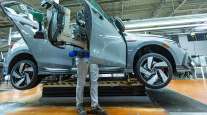VW-Navistar Deal to Yield New Engine Platform for 2021

This story appears in the Oct. 3 print edition of Transport Topics.
HANOVER, Germany — The recently announced Volkswagen-Navistar deal will yield a new North American engine platform for 2021, the top executives with both companies said here.
At a briefing with U.S. and Canadian trucking media at the IAA Commercial Vehicles Show on Sept. 21, Andreas Renschler, head of Volkswagen Truck & Bus, and Navistar CEO Troy Clarke and Chief Financial Officer Walter Borst shared details of how the partnership came to fruition and how they will proceed once it officially closes.
“We are, at the moment, developing new product lines [for the company’s brands] … and can put all the requirements from Navistar, as well, into this development,” Renschler said. VW also controls Euro- pean truck makers MAN SE and Scania Group.
“We are so excited to have found a partner … that looks at the future very similar to how we do and can bring technology, scale and get a high degree of alignment on how we look at the future,” Clarke said.
There was no visible Navistar presence at Volkswagen’s exhibit space at IAA but at a media event Sept. 20 that showcased VW’s truck family, Renschler and Clarke made an entrance in an International ProStar.
At the briefing, Clarke said once the deal closes — by early next year is the current schedule — the companies plan to “review portfolios from A to Z to see how quick we can align them.”
Clarke noted that Navistar’s current N13 engine is based on technology from MAN’s 13-liter version that meets Euro6 emission standards.
The 2021 date for a new engine platform is significant because of the new Phase 2 federal greenhouse-gas rule. Made final in August, the regulation says trucks and engines manufactured in that year must tighten their emissions of carbon dioxide and other GHGs.
Clarke said that VW and Navistar will be shipping engines to each other and looking for “immediate opportunities to save” while looking for “where are we going to be 10 years from today or 15 years from today.”
Clarke cited telematics as one area where Navistar’s OnCommand Connect program could likely be enhanced by VW’s RIO system that debuted at IAA.
VW said RIO allows all pieces of the supply chain to connect through a single system and offers recommendations for action in real time based on data analysts and other information.
Borst, who was wearing a RIO pin on his suit jacket, said that VW’s 16.6% stake is in line with the two other largest shareholders and provides appropriate representation on the board of directors. He said that it could have been cost- prohibitive for Navistar to invest in advanced technologies on its own.
Clarke said the five largest shareholders own more than 85% of the Lisle, Illinois-based firm and the 10 largest hold about 93%.
Carl Icahn and Mark Rachesky each own more than 16% of Navistar.
Feedback from Navistar’s customers has been “very positive,” said Clarke, who also joked that Borst was hugged by a dealer after an emergency meeting, which he had never seen before.
Clarke said he initially met with Renschler for dinner about a year ago and was impressed with his deep knowledge of the U.S. truck market. Renschler previously was head of Daimler AG’s commercial vehicles division, including Freightliner and Western Star Trucks in North America.
The two continued to meet on occasion to discuss their visions for the future of truck making, and around March, the companies launched serious negotiations about a venture.
As Clarke and the new Navistar leadership team have spent several years setting a new direction after the company’s failed emissions strategy at the start of the decade, he said the team had “taken steps to prepare for a partner but at the same time has become a better stand-alone company.”
All three executives touted the timing of the deal, saying the current slowdown in truck sales provides them a chance to align the companies for when the North American region regains momentum.
Navistar has been the largest purchaser of the Class 8 engines made by Cummins Inc., based on the percentage of engines used. In response to a question during Cummins’ press conference at IAA, CEO Tom Linebarger said the VW deal actually could provide a boost for the independent engine maker.
“At first, you might think that it is really bad,” Linebarger said, but the agreement will give Navistar’s customers additional confidence in the company’s turnaround. That will lift its total sales, including those with Cummins engines.
“I believe our ability to be agile and be customer partners … has served us for a long time and, I believe, will serve us for a long time in the future,” he said.




